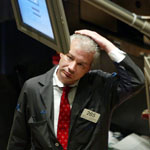
A recovery in confidence by households and businesses will be crucial to economic recovery, European Central Bank President Jean-Claude Trichet (pictured left) said, according to the transcript of a television interview. 'Households themselves can fight back,' he said, according to the transcript of the interview with Euronews television, released on Friday. 'When their confidence returns they can help fuel the recovery by consuming more, so companies will resume investment. The key is confidence,' he said. Trichet also said that the ECB had taken unprecedented steps in pumping billions of euros into the financial system and banks that had taken advantage should pass the benefit on. 'We are demanding the banks extend this credit across their client bases, and make a similar effort to the considerable one we are making,' he said. 'We are also asking them to restore their balance sheets to health, and take advantage of a range of options which different countries are offering to them. – Reuters
Dominant Social Theme: The key to whipping the downturn is to buy!
Free-Market Analysis: It is hard to believe that the president of the European Central Bank has resorted to this sort of suggestion. This is right out of the playbook of socialist economist John Maynard Keynes. Keynes, who was a central banker before he was anything else, had a fairly direct definition of an economic downturn. A downturn (recession/depression) was caused by a lack of economic activity. Thus, if the consumer could be made to spend more – consume more – then the lack of economic activity would be cured.
In order to make sure the consumer spent more, government had a role according to Keynes. Government could spend money on creating jobs, thus employing people and putting money in people's pockets. Government could also lend more money to banks to ensure that businesses would receive funds, thus in turn placing money in the pockets of people who would consume.
Today, with the experience of this latest downturn firmly at the forefront of our collective consciousness, we can see just how simplistic such an explanation is, and how convoluted is the solution that Keynes suggested. First of all, the idea that a downturn is caused by a lack of consumer demand is specious in the extreme. What actually happens is that central banks print too much, stimulate mal-investments which eventually lead the economy and the stock market off a cliff.
Second, the idea that government should utilize public works to combat the downturn and also print more money to flood the economy with liquidity is questionable, to say the least. Government is as bad at creating employment – especially lasting employment – as it is as anything else. Public works programs, as we are seeing now, often provide few jobs and even less in the way of practical, long term employment. The idea that central banks should flood the economy with liquidity sounds at least practical, but in reality it is not. During major financial crises, banks are scared to lend, even to each other. Providing them endless amounts of money doesn't get the money circulating in the economy. A deep tax cut would do the trick, but central banks have no incentive to suggest fiscal policy when their control is derived from the monetary mechanism.
On all levels, Keynes seems to strike out. His analysis of a downturn is simplistic and his solutions are unworkable. What is frightening, then, is that a man as powerful and financially astute as the head of the European Central Bank is reciting Keynesian analysis with seemingly total confidence. This is the best that Trichet can do? He quotes Keynes some 70 years after-the-fact as if Keynes is new again and his nostrums worthy of serious examination.

It is sad that Keynes is back in fashion. He was an entirely simplistic thinker who dressed up his mis-diagnoses in impenetrable mathematics and an equally impenetrable vocabulary. His ideas, misguided as they are, are being steadily implemented both in Europe and America – only because they provide the monetary elite with a justification for staying in control, not because they will do anything to alleviate the financial crisis in the short or long term. If Keynes' theories worked, gold and silver would likely subside in price. Instead, precious metals are high and likely going higher – as good a referendum on current governmental and banking policies as any.
